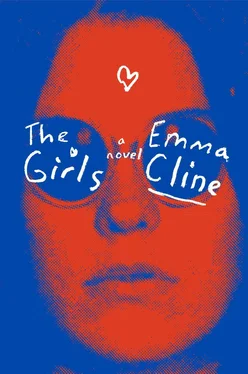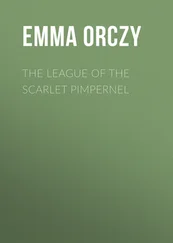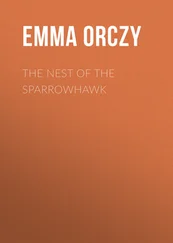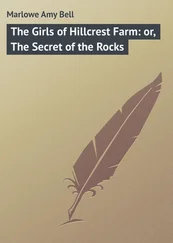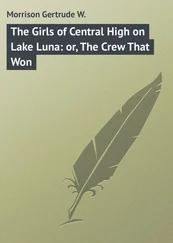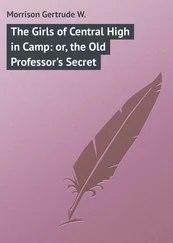When a coyote would come down from the hills and fight with the dog — the nasty, quick hiss that thrilled me — my father would shoot the coyote dead. Everything seemed that simple. The horses I copied from a pencil drawing book, shading in their graphite manes. Tracing a picture of a bobcat carrying away a vole in its jaws, the sharp tooth of nature. Later I’d see how the fear had been there all along. The flurry I felt when our mother left me alone with the nanny, Carson, who smelled damp and sat in the wrong chair. How they told me I was having fun all the time, and there was no way to explain that I wasn’t. And even moments of happiness were followed by some letdown — my father’s laugh, then the scramble to keep up with him as he strode far ahead of me. My mother’s hands on my feverish forehead, then the desperate aloneness of my sickroom, my mother disappeared into the rest of the house, talking on the phone to someone in a voice I didn’t recognize. A tray of Ritz crackers and chicken noodle soup gone cold, sallow meat breaching the scrim of fat. A starry emptiness that felt, even as a child, something like death.
I didn’t wonder how my mother spent her days. How she must have sat in the empty kitchen, the table smelling of the domestic rot of the sponge, and waited for me to clatter in from school, for my father to come home.
My father, who kissed her with a formality that embarrassed us all, who left beer bottles on the steps that trapped wasps and beat his bare chest in the morning to keep his lungs strong. He clung tight to the brute reality of his body, his thick ribbed socks showing above his shoes, flecked from the cedar sachets he kept in his drawers. The way he made a joke of checking his reflection in the hood of the car. I tried to save up things to tell him, combing through my days for something to provoke a glint of interest. It didn’t occur to me, until I was an adult, that it was strange to know so much about him when he seemed to know nothing about me. To know that he loved Leonardo da Vinci because he invented solar power and was born poor. That he could identify the make of any car just by the sound of the engine and thought everyone should know the names of trees. He liked when I agreed that business school was a scam or nodded when he said that the teenager in town who’d painted his car with peace signs was a traitor. He’d mentioned once that I should learn classical guitar, though I had never heard him listen to any music except for those theatrical cowboy bands, tapping their emerald cowboy boots and singing about yellow roses. He felt that his height was the only thing that had prevented him from achieving success.
“Robert Mitchum is short too,” he’d said to me once. “They make him stand on orange crates.”
—
As soon as I’d caught sight of the girls cutting their way through the park, my attention stayed pinned on them. The black-haired girl with her attendants, their laughter a rebuke to my aloneness. I was waiting for something without knowing what. And then it happened. Quick, but still I saw it: the girl with black hair pulled down the neckline of her dress for a brief second, exposing the red nipple of her bare breast. Right in the middle of a park swarming with people. Before I could fully believe it, the girl yanked her dress back up. They were all laughing, raunchy and careless; none of them even glanced up to see who might be watching.
The girls moved into the alley alongside the restaurant, farther past the grill. Practiced and smooth. I didn’t look away. The older one lifted the lid of a dumpster. The redhead bent down and the black-haired girl used her knee as a step, hoisting herself over the edge. She was looking for something inside, but I couldn’t imagine what. I stood to throw away my napkins and stopped at the garbage can, watching. The black-haired girl was handing things from the dumpster to the others: a bag of bread, still in its packaging, an anemic-looking cabbage that they sniffed, then tossed back in. A seemingly well-established procedure — would they actually eat the food? When the black-haired girl emerged for the last time, climbing over the rim and slinging her weight onto the ground, she was holding something in her hands. It was a strange shape, the color of my own skin, and I edged closer.
When I realized it was an uncooked chicken, sheened in plastic, I must have stared harder, since the black-haired girl turned and caught my glance. She smiled and my stomach dropped. Something seemed to pass between us, a subtle rearranging of air. The frank, unapologetic way she held my gaze. But she jarred back to attention when the screen door of the restaurant banged open. Out came a hefty man, already shouting. Shooing them like dogs. The girls grabbed the bag of bread and the chicken and took off running. The man stopped and watched them for a minute. Wiping his large hands on his apron, his chest moving with effort.
By then the girls were a block away, their hair streaming behind them like flags, and a black school bus heaved past and slowed, and the three of them disappeared inside.
—
The sight of them; the gruesomely fetal quality of the chicken, the cherry of the girl’s single nipple. All of it was so garish, and maybe that’s why I kept thinking of them. I couldn’t put it together. Why these girls needed food from the dumpster. Who had been driving the bus, what kind of people would paint it that color. I’d seen that they were dear to one another, the girls, that they’d passed into a familial contract — they were sure of what they were together. The long night that stretched ahead, my mother out with Sal, suddenly seemed unbearable.
—
That was the first time I ever saw Suzanne — her black hair marking her, even at a distance, as different, her smile at me direct and assessing. I couldn’t explain it to myself, the wrench I got from looking at her. She seemed as strange and raw as those flowers that bloom in lurid explosion once every five years, the gaudy, prickling tease that was almost the same thing as beauty. And what had the girl seen when she looked at me?
I used the bathroom inside the restaurant. Keep truckin’ , scrawled with a marker. Tess Pyle eats dick! The accompanying illustrations had been crossed out. All the silly, cryptic marks of humans who were resigned to being held in a place, shunted through the perfunctory order of things. Who wanted to make some small protest. The saddest: Fuck, written in pencil.
While I washed my hands, drying them with a stiff towel, I studied myself in the mirror over the sink. For a moment, I tried to see myself through the eyes of the girl with the black hair, or even the boy in the cowboy hat, studying my features for a vibration under the skin. The effort was visible in my face, and I felt ashamed. No wonder the boy had seemed disgusted: he must have seen the longing in me. Seen how my face was blatant with need, like an orphan’s empty dish. And that was the difference between me and the black-haired girl — her face answered all its own questions.
I didn’t want to know these things about myself. I splashed water on my face, cold water, like Connie had once told me to do. “Cold water makes your pores close up,” and maybe it was true: I felt my skin tighten, water dripping down my face and neck. How desperately Connie and I thought that if we performed these rituals — washed our faces with cold water, brushed our hair into a static frenzy with a boar-bristle brush before bed — some proof would solve itself and a new life would spread out before us.
Cha ching, the slot machine in Connie’s garage went, like a cartoon, Peter’s features soaked in its rosy glow. He was eighteen, Connie’s older brother, and his forearms were the color of toast. His friend Henry hovered at his side. Connie decided she had a crush on Henry, so our Friday night would be devoted to perching on the weight-lifting bench, Henry’s orange motorcycle parked beside us like a prize pony. We’d watch the boys play the slot machine, drinking the off-brand beer Connie’s father kept in the garage fridge. Later they’d shoot the empty bottles with a BB gun, crowing at each glassy burst.
Читать дальше
